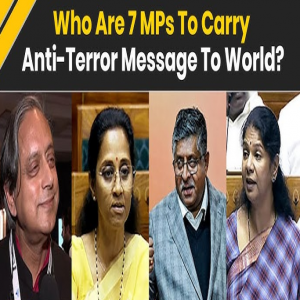
.png) Robert Clements
Robert Clements
.png)
I sit thousands of miles away from home, flipping through international newspapers and watching foreign news channels, and a growing discomfort gnaws at me — a quiet but unmistakable realisation: nobody believes us anymore.
Yes, I do believe Operation Sindoor was necessary. I believe it was executed with precision and resolve. But outside our borders, the reaction is neither admiration nor applause. It is a smirk. A shrug. A polite nod, as though saying, "Yes, yes, we've heard this before." And it hits me harder than I expect — they no longer take us seriously.
We are not believed anymore.
How else do I explain the IMF offering a bailout to Pakistan, days after our claims of isolating them diplomatically? How else do I understand the subtle yet telling shift — our country, which I have been raised to believe is the fourth-largest economy, now being hyphenated with the very neighbour we say sponsors terror?
It's no longer just "India," it's "India-Pakistan," and not on cricket grounds — but in global policy briefs, economic assessments, and television think tank panels.
What's worse is watching the leader of the free world host the Pakistani army chief — not their prime minister or foreign minister — but the man in uniform, with a dinner and a smile.
This is not normal diplomacy. This is symbolism. Powerful, loaded, deliberate.
And while we thump our chests back home, holding up statements from our foreign minister as masterpieces of global persuasion, the world barely flinches. Shashi Tharoor can charm any Oxford Union hall, and Kanimozhi, can deliver rhetoric with thunder and flame in Chennai — but outside, their words echo in a chamber growing increasingly empty.
Then come the moments that truly wound. The Pahalgam attacks. Innocent tourists, killed without mercy. And the world… stays silent. No global solidarity. No statements of condemnation from key allies. Just a few customary lines from Washington, and silence elsewhere. What does that tell us?
It tells us we are no longer seen as trustworthy narrators of our own story.
And here's where it begins to hurt. Because the real question is not "Why doesn't the world believe us?" but "Have we begun to believe the lies we tell ourselves?"
Our media repeats the same stories — victories, heroism, dominance — while dismissing criticism as treason, anti-nationalism or worse, foreign conspiracy.
But my dear friends, beyond our borders, the narrative looks very different. Our truths are no longer their truths.
And that's dangerous.
When a nation stops examining itself, it stops evolving. When a people stop questioning, they stop progressing. And when truth is replaced by lies, it takes only a few years for credibility to erode — not just in foreign capitals, but in our own country.
I love my country. I want to believe. But belief without truth is a lie dressed in patriotism.
The world has stopped believing us.
Will we now have the courage to stand up for the truth?